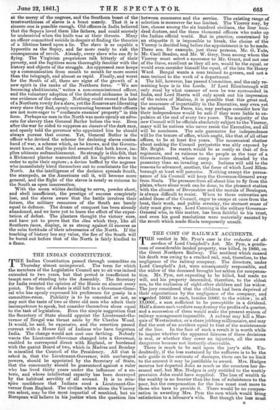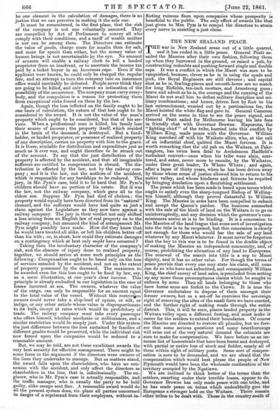THE COST OF RAILWAY ACCIDENTS. T HE verdict in Mr. Pym's
case is the reductio ad ab- surdum, of Lord Campbell's Act. Mr. Ppm, a gentle- man of considerable landed property, was killed, in 1860, on the Great Northern Railway. The accident which caused his death was owing to a cracked rail, and, therefore, to the negligence of the railway company. The directors, under Lord Campbell's Act, were consequently responsible, and the widow of the deceased brought her action for compensa- tion. Mr. Pym, not expecting to be killed, had made no will, and his property descended, therefore, to the eldest son, to the exclusion of eight other children and his widow. The jury considered that the children had been deprived of their expectations by the negligence of the company, and alitrded 15001. to each, besides 10001. to the widow ; in all. 13,0001., a sum sufficient to be perceptible in a dividend. Half a dozen such verdicts may destroy the profits of a quarter, and a succession of them would make the present system of railway management impossible. A railway may kill a Mar- quis of Westminster, or a share jobbing millionnaire, and may find the cost of an accident equal to that of the maintenance of the line. In the face of such a result it is worth while to inquire whether the apparent fairness of these decisions is real, or whether they cover an injustice, all the more dangerous because not instantly observable.
There is much to be said upon the jury's side. Un- doubtedly, if the loss sustained by the sufferers is to be the sole guide in the estimate of damages, there can be no limit to the amount it may be justifiable to award. Mrs. Hodges mourns her departed John as much as the countess her de- ceased earl, but Mrs. Hodges is only entitled to the weekly provision John could have supplied. The loss of wealth to the wealthy is no heavier than the loss of subsistence to the poor, but the compensation for the loss must cost more to those who have to provide it. There would be no compen- sation in awarding Mrs. Pym the sum which would bring satisfaction to a labourer's wife. But though the loss must be one element in the calculation of damages, there is no justice that we can perceive in making it the sole one. It must be remembered, in the first place, that the risk of the company is not one voluntarily assumed. They are compelled by Act of Parliament to convey all who comply with their conditions, and a tariff of wealth neither is nor can be among them. The Directors can estimate the value of goods, charge more for muslin than for salt, and more for specie than either, but the money value of human beings is not ascertainable py the eye. No amount of acumen will enable a railway clerk to tell a landed proprietor from an insolvent, or to ascertain the income tax paid by a ticket buyer in an Inverness cape. Even if the applicant were known, he could only be charged the regular fare, and an attempt to turn the company into an insurance office would inevitably be defeated. People never think they are going to be killed, and only resent an intimation of the possibility of the occurrence. The company must carry every- body, and the compulsion is a reason for protecting them from exceptional risks forced on them by the law. Again, though the loss inflicted on the family ought to be one basis of calculation, the nature of that loss ought to be considered in the award. It is not the value of the man's property which ought to be considered, but that of his ser- vices. When a professional man is killed, his family lose their source of income ; the property itself, which resided in the brain of the deceased, is destroyed. But a fund- holder, or landed proprietor, or possessor of realized property of any description, carries no property with him to the grave. It is there, available for distribution and expenditure just as much as it ever was, and ought therefore to be struck out of the account. To say that the just distribution of the property is affected by the accident, and that all imaginable sufferers are entitled to compensation is absurd. The dis- tribution is effected by the law, not by the railway com- pany ; and it is the law, not the authors of the accident, which is responsible for any hardships to be endured. The jury, in Mr. Pym's case, held it to be hard that Mr. Pym's children should have no portion of his estate. But it was the law, not the railway company, which gave all to the eldest son. Suppose Mr. Pym had died of cholera ; the property would equally have been diverted from its "natural" channel, and the sufferers would have had quite as just a claim against the Legislature as they now have against a railway company. The jury in their verdict not only shifted a loss arising from an English law of real property on to the railway company, but assumed the kind of arrangement Mr. Pym might possibly have made. How did they know that he would have treated all alike, or left his children better off than his wife ; or, in short, how could they estimate damages on a contingency which at best only might have occurred ? Taking then the involuntary character of the company's risk, and the absence of injury done to realized property, together, we should arrive at some such principles as the following : Compensation ought to be based only on the loss of services entailed by the accident, and not on the extent of property possessed by the deceased. The maximum to be awarded even for this loss ought to be fixed by law, say, as a mere illustration, at one year's clear income. This principle is already embodied in our legislation in the case of losses incurred at sea. The owners, whatever the value of the cargo, can only be responsible for an amount equal to the total value of the vessel. Without this restriction owners could never take a ship-load of opium, or silk, or indigo, or any other article whose value is disproportionate to its bulk, except at rates which would be prohibitory of trade. The railway company must take every passenger who offers himself, whether mechanic or millionnaire, and a similar restriction would be simply just. Under this system the just difference between the loss sustained by families of different grades would be preserved, while the individual risk now forced upon the companies would be reduced to a reasonable amount.
But, we may be told, are not these exorbitant awards the very best security for effective management. There might be some force in the argument if the directors were owners of the lines they undertake to manage. But as matters stand, the award falls upon the shareholders, who have no con- nexion with the accident, and only affect the directors as shareholders in the line, that is, infinitesimally. The en- gineer, who in Mr. Pym's case is actually responsible, and the traffic manager, who is usually the party to be held guilty, alike escape scot free. A reasonable award would do all the present system does, viz. place all parties concerned in danger of a reprimand from their employers, without in- flicting ruinous fines upon companies whose prosperity is beneficial to the public. The only effect of awards like that just given to Mrs. Pym is to compel the directors to strain every nerve in resisting a just claim.































 Previous page
Previous page